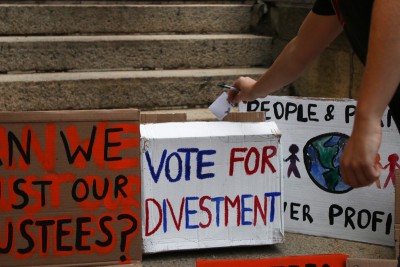
While the Boston University community is generally pleased that the BU Board of Trustees endorsed two of the Advisory Committee on Socially Responsible Investing’s proposals, many said they are not satisfied with the university’s small steps toward fossil fuel divestment.
The Board of Trustees released its decisions Tuesday. Instead of rejecting or accepting ACSRI’s recommendation on divestment, the Board of Trustees stated that they will “avoid” investment in companies that extract coal and tar sands, The Daily Free Press reported Tuesday.
“We thought the wording ‘avoid’ was a noncommittal term,” Divest BU President Matt Thacker said on the Board of Trustees’ use of vague language.
He said the language shows that the university is not fully committed to the divestment of fossil fuels.
“The word ‘divest’ has been the word used throughout this entire process, including in the ACSRI recommendation,” the College of Arts and Sciences junior said. “Going from a verb that has a very specific meaning within this context to saying they’re going to ‘avoid these investments’ is a lot less powerful and leaves a lot more open to interpretation.”
Thacker said although Divest BU is enthusiastic about the new Climate Action Plan, they are still pushing for more substantial commitment from the university.
“It’s very important for BU to continue to act to the best of our ability, to improve our own carbon footprint and contributions to climate change,” Thacker said. “We think the university can and should do better on that.”
Robb Dixon, a member of the ACSRI, said he is happy with the board’s decision because it was an appropriate first step.
“Looking forward, the trustees have agreed to review the situation periodically going into the future,” the Questrom School of Business professor said. “We may find that the situation changes either because breakthrough discoveries are made or because we discover we’ve hit tipping points that make it all the more urgent.”
Dixon said although the trustees did not give a finite response to the ACSRI’s recommendation on fossil fuel divestment, members of the committee were not surprised.
“If you talk to an industry expert, there’s a general agreement about what exploration activities are,” he said. “We did not define that in the advisory committee, and that might have led to some misunderstandings. That would’ve been somewhat difficult from an operational respective to actually figure out what [exploration activities] would entail.”
Danielle Cadet, a senior in the Sargent College of Health and Rehabilitation Sciences, said trustees should listen to the advice from the ACSRI and the students who are devoted to the cause.
“BU should do as they were recommended and what the students believe in,” Cadet said. “[They should] try not to invest in these companies and find better companies that stand for better things.”
Christina Carpio, a sophomore in the College of General Studies, said while she understands the importance of fossil fuel divestment, it might be a lot to ask of the university.
“I’m from San Francisco, so going green and saving the environment is very big there,” Carpio said. “There are also smaller things though that BU can address since this seems like a huge issue. [Divestment] is worth looking into, but could be taken in smaller steps.”
Mathis Rodriguez, a junior in the College of Communication, said despite the university’s small steps toward divestment, it could be a model for other major universities.
“BU is a very large institution,” Rodriguez said. “Other universities and people look up to this place as an example, so we could really set a precedent here if they follow through with this.”



